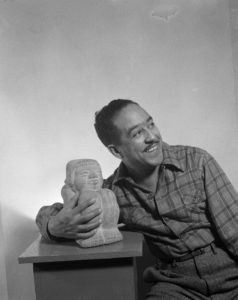Langston Hughes
(1902–1967), the only Cleveland-bred artist to be honored as one of Northeast Ohio’s Past Masters in two categories: Literature (see AUTHORS) and Theater. It was as a student at Cleveland’s Central High School that he first began to write seriously—first poems, then stories, novels, essays, autobiographies and an immensely popular newspaper column. But it was his discovery of Karamu House (then known as the Playhouse Settlement) that sparked his passion for the stage and lit a fire under his creativity that was to burn for decades. Indeed, a number of his dozen acclaimed plays were first produced and fine-tuned there before going on to New York and national fame.
Among his most important plays are Mule Bone (1931), Mulatto (1935), Little Ham (1936), Simply Heavenly (1957), Tambourines to Glory (1958) and Black Nativity (1961). He also provided the lyrics for a Pulitzer Prize-winning opera, Street Scene (1946), with music by Kurt Weill and book by Elmer Rice; and the lyrics and book (with William Hairston) for Jericho-Jim Crow (1964), a pioneering work in the urban contemporary gospel music style that was based on the themes of the Civil Rights Movement. According to Hughes scholar and biographer Arnold Rampersad, Hughes “virtually pioneered” the black gospel musical, first with Black Nativity (1961) and then with Jericho-Jim Crow.

Library of Congress, Prints & Photographs Division, FSA/OWI Collection, [REPRODUCTION NUMBER: LC-USW3-033841-C]
According to Hughes scholar and biographer Arnold Rampersad, Hughes “virtually pioneered” the black gospel musical, first with Black Nativity (1961) and then with Jericho-Jim Crow. Several of Hughes’ plays were first mounted at Cleveland’s Karamu theater, where Hughes had cut his artistic teeth as a high school student and with which he retained an active working relationship. Several of his plays were tried out (and no doubt honed) at Karamu before they went to Broadway, often after hours at the home of Reuben and Dorothy Silver. But, as Hughes also was acclaimed for his work as a poet, short story writer, novelist, columnist, librettist and autobiographer, we may decide to honor him for his whole range of writing.
But, even as he became a true man of the world, with much of his time spent in New York, he retained close ties to Cleveland and an active working relationship with Karamu, where several of his plays were tried out before going on to Broadway—then honed and polished after hours at the Cleveland Heights home of his longtime dear friends, Karamu’s artistic director, the late Reuben Silver, and his wife, distinguished actor-director Dorothy Silver, who has many great stories to tell.
*Daniel Silver would one day become principal clarinet of the Hong Kong Philharmonic.